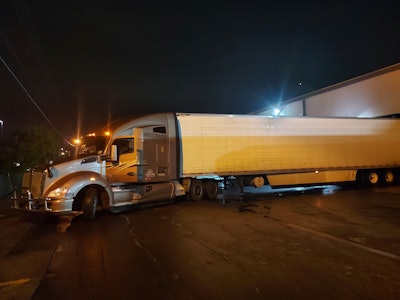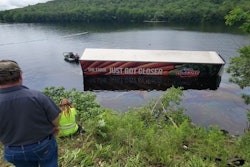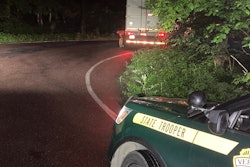 Not a bad haul for a few minutes walking the garden, is it?
Not a bad haul for a few minutes walking the garden, is it?
Summer in full swing means two things to me: The height of reefer season and raspberries growing in my yard. With reefer spot rates at a dismal $2.47 a mile, and the berries I pick turning to mush almost instantly after picking, I started wrestling with a question.
How does anyone make a dime in the reefer business with the fickle nature of produce?
If I can't get a tupperware full of fresh berries to survive a cross-town car ride to visit with friends, how is it that anyone, anywhere gets any sort of fresh fruit or vegetable? Especially us poor frigid Vermonters expecting to enjoy Romaine lettuce through the winter.
The answer, of course, is trucking. With reefer season in full bloom, Overdrive sought to learn a little more about the trucking trade that stocks the shelves, feeds America, and brings the farm to market.
Specifically, we wanted to know the tricks of the trade, or how to make it in the reefer business and what you might want to avoid.
Florida-based leased owner-operator Scott Hunter knows all too well how often a driver can get dinged for minor defects, and has something of a playbook to defend against shippers and receivers claiming something rotten.

Hunter has hauled reefers along the East Coast for more than 16 years and has seen all that can go wrong from the farm to the receiver's dock.
"When it comes to produce, when it's in season, we don't really have any problems," said Hunter, but make sure you get to the farm early, especially if it's down South.
 Scott Hunter's truck backed into the dock. When he gets loaded and unloaded, he watches like a hawk to make sure he doesn't get blamed for flash frozen or warmed over produce.Scott Hunter
Scott Hunter's truck backed into the dock. When he gets loaded and unloaded, he watches like a hawk to make sure he doesn't get blamed for flash frozen or warmed over produce.Scott Hunter
"Say watermelon season for example," said Hunter. "A lot of times it starts down in south Florida and very quickly moves to north Florida and southern Georgia. Except for that very first load in the morning, they're out there picking at 90 degrees and putting it on the trailer at 90 degrees when I'm supposed to unload it at 48."
As any reefer hauler will know, these units "are not a refrigerator, they're not designed to cool, but to maintain," he said.
The result of picking up that late-day produce is "going balls to the walls full tilt to bring it down into the 70s with 12 or 13 really hard hours on your unit," said Hunter. To protect himself in these situations, he writes a note directly on the bill of lading.
"Product loaded hot at 92 degrees, unable to cool product before delivery," for example. "Sometimes the shippers get very upset at that, but then I say 'OK, take it off my truck. I'm not getting stuck with that.'"
Also, look out for late-season loads. Hunter said shippers often load up a bunch of "marginal stuff on the dock they try to sneak past you."
Again, the fix here, according to Hunter, is to write that on the bill.
Once the produce goes on the truck, Hunter accepts full responsibility, but being "meticulous" at the shipper goes a long way.
"When COVID hit, everyone stopped letting you on the dock, but still they want to let you sign the bill of lading for responsibility," he said. "One of the big things is to count your product and verify what’s going on your trailer, and if you're not allowed on the dock, make a note on the bill: 'Count is verified by shipper.'"
Take avocados for example, the tropical fruit so beloved by Millennials that they may have skipped right over home ownership in order to enjoy a few more at brunch (according to one millionaire). Hunter said hauling them has become a big money game.
"I actually had to up my cargo insurance because of the rising cost of avocados," he said. With 20 or so pallets of avocados, dozens in a single case, and 88 cases to the pallet, "that's enormous money, I had to insure for $220,000."
That big money is another reason to ensure the count yourself, or otherwise note if not. "Some of the shippers, if they can put one less case on each pallet they're saving themselves $2,000 a truckload," he said.
Hunter explained that suppliers will get avocados at a ripeness stage 0, which is "fresh, ripe and hard as a baseball." Then, the supplier takes them into a proofing room until they're a stage 1 or 2.
If a store gets a delivery on Monday, they put out the stage 2 avocados for the week and then towards the weekend, they put out the stage 0 avocados, which have now matured.
"Now if you don’t have your temp correct, if it's off a couple degrees," and the stage 0 all turn into stage 2, "they lose their minds. That’s $10,000 worth of avocado on the pallet they can no longer use," he said. "If they get up to a stage 4 or 5, then they buy the pallet strictly to make guacamole, or try to refuse it, saying 'this isn't what we ordered.'"
Of course, in this situation, the shipper comes after Hunter, and Hunter provides a print out of the the temperature history in his reefer, and likely also points to the bill of lading, on which he'd note any other specific defects.
That's why Hunter says it's important to run your reefer on "continuous" rather than cycle.
"The problems that I see people having with avocados, mangos, tomatoes, kiwi fruit -- things of that nature -- is when a lot of guys will try to nip corners and instead of running reefer continuously, they run it on cycle," he said.
The result is that when the reefer does operate on cycle and the temperature is out of range, the reefer pushes out freezing cold air to quickly try to get back down to temp. "You flash freeze the first couple of pallets and there's a lot of rejections and issues," he said.
Other issues, like an onion getting mashed into the corrugated trailer floor and causing a stinky mess can also set a reefer hauler back.
But the absolute worst thing we heard of stinking up a reefer was brine shrimp. These are the only fish capable of living in Utah's Great Salt Lake, and along with that unique setting, apparently, comes a unique, unforgettable smell.
Owner-operator Ron Henrie runs reefers out of Utah, but not into California. As such, he's mostly into frozen foods, often fish. One time, however, he hauled a load of brine shrimp, a tiny crustaecean, to a fish hatchery and spent the next few months regretting it.  Ron Henrie and his wife stand by his new Peterbilt.Courtesy of Ron Henrie
Ron Henrie and his wife stand by his new Peterbilt.Courtesy of Ron Henrie
"It stunk up the trailer so bad, I washed it four times, put coffee in it, we tried everything," said Henrie. "It took me months. I actually went and parked my trailer in a field and left the doors open. I had the kids throwing coffee in it for a month and a half."
The smell was so bad that during that time, Henrie had to rent another reefer to keep hauling until the smell faded.
That's the exact type of loss of income a reefer hauler can suffer at the hands of food, whether fish-bound or human, and another good reason to be "meticulous" in loading and unloading.









